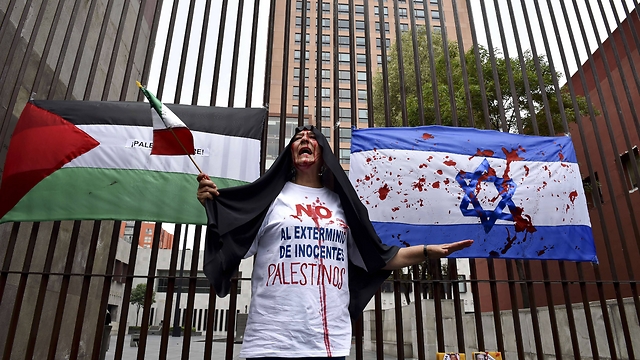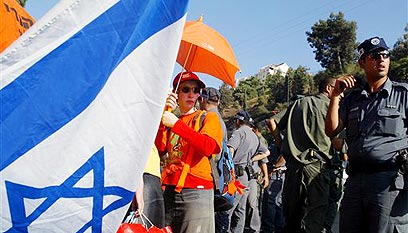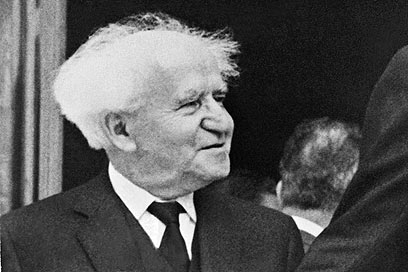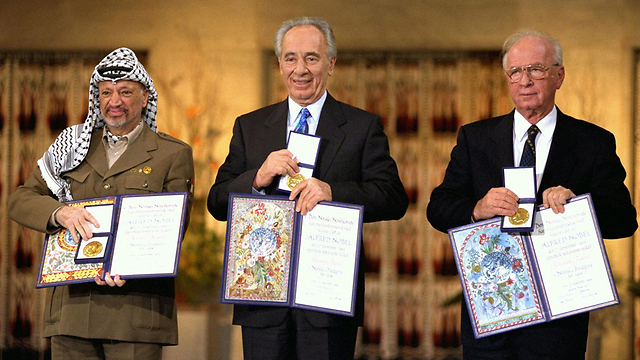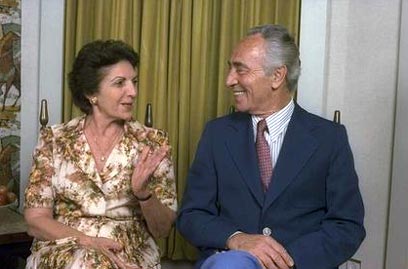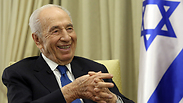
Peres' post-presidency vision: Hamas-free Gaza, peaceful Israel
After almost 70 years of public service, Peres has left the president's official residence in Jerusalem and moved into an apartment in Tel Aviv; he hosted Yedioth for a series of special conversations on war, peace, his late wife Sonia and his plans for the future at the age of 91.
That's how it began. And then a war broke out and the mood changed and the losses became heavier and the honorable president was asked to button up his suit and draft answer to questions, as he has become accustomed to doing – and first of all, what were we pursuing?
The goal: "To stop the lawlessness of the killing and the acts of terror from Gaza. Why this entire weapons arsenal has one goal – to commit a mass massacre against civilians. At the end, I hope, the Gaza Strip's residents will be well aware of the fact that there is one element causing them damage and leading to bloodshed and seriously hurting innocent people, as well as preventing an economic bloom and prosperity, and that is Hamas. It is disastrous for them."
Political goal: "I hope that the time will come when the Palestinian people free themselves from their real oppressors, the terrorists. I hope that Palestinian Authority Chairman Mahmoud Abbas, who is showing responsibility and moderation and working, in my opinion, in the best interest of his people, will eventually enter Gaza and work to make it progress and prosper, and that eventually a peace process will be completed for the West Bank and the Gaza Strip."
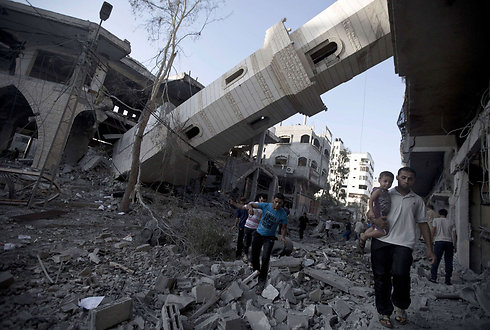
Negotiations with Hamas: "We must always remember that Hamas in its current format is a murderous terror organization, and that there will be no negotiations with a terror organization. But it can make a strategic decision that will change its ways. It can completely renounce terror, honor past agreements and recognize Israel. I am surprised by this question, because Hamas is the one refusing to talk about peace and about the three Quartet conditions, not us."
Abbas is no partner: "I completely disagree with this statement. Fortunately, there are many people, both in the defense establishment and in Israel's political system, who understand very well that we won't have a better partner than Abbas.
"I have no doubt that Abbas is a partner for peace. He proves his earnestness and leadership. Senior military official stress how just how extensive his activity is in preventing terror and escalation in the West Bank, and I believe that many citizens appreciate the fact that he sat with the Arab League and spoke clearly against the terrorists who kidnapped three of our teens, condemned terrorism and called on them to return the boys to their families.
"His clear and brave statement, 'I was born in Safed and I know I will not return to Safed,' is very important and demonstrates that there is a future and ability to solve the differences between the sides. As a person familiar with the depths of the negotiations, I can say loud and clear that the gaps are bridgeable.
"A leader must be judged by his actions. I expect us all to judge Abbas by his actual deeds."
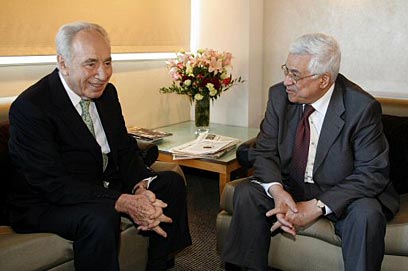
An anti-Israel world: "There isn't a more ethical response than a nation defending itself. I can say loud and clear: The IDF is the most moral army in the world. There isn't a single leader in Europe or a single citizen or even a single protestor who would tolerate missiles being fired at their cities and tunnels of death towards their homes.
"The protests were hypocritical and the result of the difficult images pouring in from Gaza. But I say to all the leaders who meet with me and in all the interviews I give to the international press that these images were not created by Israel and were not created by the media. Hamas created these images with its own hands."
Facing killed Gazan children: "I say loud and clear that the IDF commanders and soldiers are extremely strict about not hurting innocent civilians. It's part of the fighters' ethical and moral code. The harsh reality we see in Gaza was created by Hamas. It is the one who should be defending children rather than firing at them. Unfortunately, Hamas sends its children to serve as its human shield. This is a serious matter like no other."
Peace: "I have no doubt that there will be peace eventually. The grandeur of leaders is not giving in to crises, working to prevent war, leading the people and creating opportunities for reconciliation. No one believed that Israel would live in peace with Egypt and that Sadat would visit Israel's Knesset. No one believed that there would be peace with Jordan either and that a peace camp would be established among the Palestinians.
"I believe that in the future there will be peace with all the Palestinians. I say that the gaps are bridgeable and that the Palestinian Authority is led today by a man, Mahmoud Abbas, who is showing responsibility and moderation, and he is definitely a leader we can reach a peace agreement with. His actions prove it.
"It's also important to see the opportunities opening up in the Arab world. Many Arab states see the terror organizations as their enemy and an identity of interests is now being created between us and them, an identity which could help advance the process while influencing the state of our relations with the entire Arab world."
A new Middle East: "It's a simple matter. There is a new world, and the Arab world is in a transition period into it from the previous world. There are 350 million Arabs in the Middle East, 60% of them are under the age of 25 and 100 million are connected to the Internet. They are the ones who created the Arab Spring, brought about elections, but were not organized enough to win. The battle will go. Fundamentalism has no future."
Mr. President, if you will, some thoughts about the disengagement from Gaza in retrospect.
The disengagement: "It wasn't complete, but it wasn't a mistake. Imagine what would have happened if we had remained with 22 communities in Gaza. They would have been Hamas' main target."
We remind him that we could have stayed and controlled the territory.
Controlling Gaza: "When we were in that territory, 26 people were killed in Netzarim alone. And I don't remember the numbers in other communities. The IDF and the communities would have turned into a permanent target, and as Hamas' weapons would have improved, the danger could have been greater."
2050: "I have no doubt Israel will live in peace by then, and that I will even be able to enjoy its fruits that year. Just kidding."
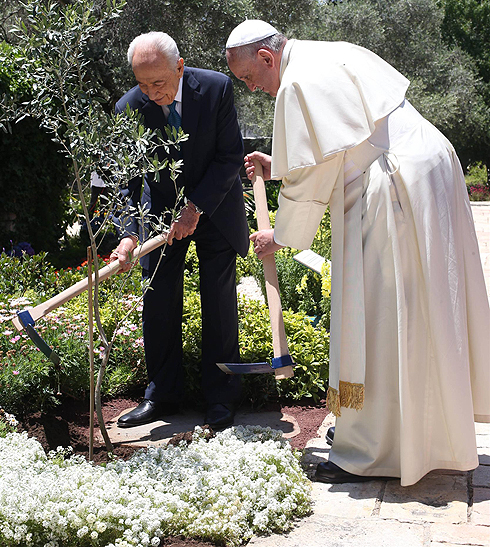
The farewell: After seven years of serving as president, 48 years of being a Knesset member (from 1959), two terms as prime minister (1984-1986 in rotation with Yitzhak Shamir, and 1995-1996 after the Rabin murder), serving as minister in 12 governments and losing five elections (four for prime minister, one for president), 91-year-old Peres (born August 2) has gone home. Is he really?
Really? Not really. "I am moving from one human period to another human period," Peres says, adding that he is excited by the departure. "The President's Residence, people say, is a gilded cage. If you like gold, you'll stay here. The happiness is in flying forward."
Later on, he says, he'll settle at the Peres Center for Peace in Jaffa and focus on scientific campaigns he has been interested in for a long time now – nanotechnology and brain research. "My job is to raise money, but not to hand it out," he clarifies, lowering expectations.
In addition, he reveals, he is opening an economic company together with his son Chemi and his close staff from the President's Residence, which he says will advance peace and democratization in the Middle East and in the entire world through investments in education, medicine, technology, water and agriculture ("for example, a long-distance hospital").
Residence: "I sold the apartment on Oppenheimer Street in Ramat Aviv and I will live in Tel Aviv, on the beach, at the Ne'eman Towers. I bought a three-room apartment there," he clarifies.
Content: He only took books with him to Tel Aviv. "I have many books signed by the authors – (Charles) de Gaulle, Diana, (Nathan) Alterman, Oz, Yizhar and David Grossman."
Diana: "The princess."
Wrinkles: Peres describes his personality as "mature" from an early age. "At the age of 11 I was already living a political life. One aunt was the head of the Hashomer Hatzair youth movement in the city and another uncle was the head of the Beitar movement. In such a house one only hears politics."
Childhood: He was born in 1923 in Wiszniew, a town near Minsk, which belonged to Poland at the time and is today part of of Belarus, on the Lithuanian border. His mother, Sara, was a librarian and a Russian teacher. His father, Yitzhak, was a lumber merchant, an offspring of Rabbi Chaim Volozhin, founder of the Volozhin Yeshiva ("the mother of all yeshivot"), and the house, he says, was traditional-secular.
When he was four years old, he recalls, he received a longevity blessing from the "Chafetz Chaim" (Rabbi Yisrael Meir Kagan), who resided in the nearby township of Raduń, and his cultural world was shaped by his paternal grandfather, Rabbi Zvi Hirsch Meltzer, who introduced to the world of Talmud studies, alongside secular reading of Hebrew and global literature.
In 1934, when he was 11 years old, on his way to Israel with his family, his grandfather gave him a hug at the railway station and said to him, "Son, be Jewish."
God: "I believe," Peres states firmly, but "not in the afterlife and things like that." According to him, choosing faith is basically choosing responsibility. He says that until he immigrated to Israel he used to wear a cap; then he took it off.
"The moment I got off the ship I said to myself that I don't need it anymore," he says. "I went from a grey sky to a blue country, that's what I remember. Tanned people appealed to me."
He continued his elementary studies at the Balfour School in Tel Aviv, and then moved to the boarding school at the Ben Shemen Youth Village.
Ben Shemen: When he was 14, he was admitted to the boarding school as part of the allocation of spots for different youth movements. As a member of Hanoar Haoved ("the working youth"), he was sent to the boarding school with his good friend, Mula Cohen.
Crisis with the parents: "What crisis? I was independent from the day I was born, a sort of whiz kid. I just informed my parent that I was going. No one tried to stop me and no one asked why."
In the boarding school he met Moshe Tehilimzeigger, who later became known as journalist and author Dahn Ben-Amotz and was one year younger than him.
Dahn Ben-Amotz: "You'll be surprised. He was the symbol of the Diaspora and was the main social person, the one who organized the Hanoar Haoved branch in the boarding school, which wasn't legal by the way. I always talked and was elected to the class committee."
Ben-Amotz, he says, went through his Sabra metamorphosis after the Ben Shemen era and strangely adopted the name "Ben-Amotz" as his surname, although it was the name Shimon Peres had chosen to use in articles he wrote for the boarding school's bulletin. "I really wasn't annoyed by it," he says about Tehilimzeigger's choice, "and I'll tell you why."
Story: "We had a Hebrew teacher, whose name was Grynszpan and who came from Vilnius, and he was one of those people who use rhymes when they speak. He would say, for example, 'A table without olives ('zeitim') is like a cemetery without dead people ('metim').' One day we conducted a public trial. The subject was Baruch of Magenza (from Shaul Tchernichovsky's poem, a Jew who converted to Christianity during the riots against the Jews of Mainz in 1096). I, 15 years old at the time, was the defense counsel, and he, Grynszpan the teacher, was the prosecutor. I had a lot of chutzpah at the time, and as things heated up, he said to me, 'Shimon Ben-Amotz, who jumped in the mud ('botz') and a got a thorn ('kotz') stuck in his nose.' That day I gave up on the Ben-Amotz."
From Perski to Peres: "One day our group members decided to choose Hebrew names. I chose Ben-Amotz, until in 1944, during a 21-day Hanoar Haoved trip from Revivim to Eilat, we were 12 guys with seven Palmach members and 14 camels. Suddenly we were stopped in the Arava by our guide, Prof. Heinrich Mendelssohn, who pointed at a large bird rising up from an acacia tree and said: 'That's a Peres (bearded vulture).' I decided to climb up to the nest, and when I came down everyone was already calling me Peres. And you should know that at a zoo in Argentina they called two bearded vultures Shimon and Sonia."
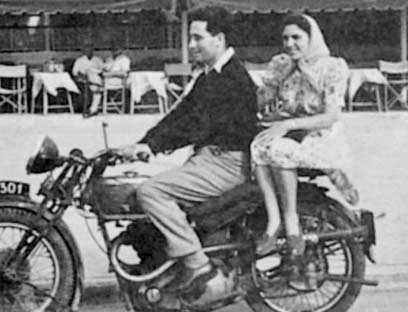
Sonia: She was the daughter of Yaakov Gelman, the boarding school's carpentry teacher. "I met her when I was a post commander," says Shimon, "in a sort of small pillbox for two, near their home. When I would come down in the morning from the watch, I would see her watering the lawn, and I fell in love with her at first sight."
And she: "She didn't fall in love with me at first sight," he recounts. "But I was 16 and I courted her. I read her Karl Marx and I can't say that she was excited. So I read her poem by Moshe'le Tabenkin, who wrote wonderful love songs, and of course Alterman." He says it took him a year to convince her.
The turning point: "When we went out together to water the cucumber plot, the ice broke. You should know that young cucumber have a special scent. So we talked and we got closer, and five years later there was a wedding. Two weddings, actually."
First wedding: May 1, 1945, on Lag B'Omer, in Kibbutz Alumot, which he was a member of and one of the founders. "I wore flannel pants and a black battledress," says Peres, "clothes which belonged to everyone and were given to whoever had a festive event."
Second wedding: "The next day, in Ben Shemen, at the swimming pool. There was a swimming pool, but it was emptied out. People sat on the edges and danced below."
The honeymoon: "The friends from Alumot arranged a hammock for us between two Eucalyptuses near Lower Bitania, and Sonia and I would go down to the Jordan River in the morning to swim. I had a big Triumph motorcycle at the time which I received from Hanoar Haoved. After the swim we would go for a ride."
Diaspora image: "I was never interested in socializing. I started my own bonfires. There was actually a conflict. I was a man of Ben-Gurion, who saw the Bible's prophets as the most important thing, and they were people of (Yitzhak) Tabenkin (one of the founders of the Kibbutz Movement), Marxists. In addition, they were maximalists, in favor of the land's integrity. Ben-Gurion was in favor of dividing the land in order to fulfill the vision of the Jewish state in a practical manner."
Palmach: "I didn't go to the Palmach, because I was in the Haganah from age 16 and was in the Ben Shemen 'patrol car" and carried a gun, like in the Palmach. So all the years I was defamed for being a man of Ben-Gurion, while they went with Siyah Bet (of the Mapai party), Ahdut Ha'avoda."
He says they didn’t forgive him for being elected one day to the Hanoar Haoved leadership, and when he saw that he couldn't pass any decisions ("I was 16 year old"), he went with a friend (Amos Degani) to the movement's branches, organized trips and gained power.
"They didn't forgive me. I was considered the man who stole Hanoar Haoved from Tabenkin for Ben-Gurion. They didn't forgive me. Starting with Tabenkin, (Aharon) Zisling, Yigal Allon and even Yisrael Galili. They didn't like me. I was different. They were Palmach and I was Haganah."
He rejects the idea that it all stemmed from the fact that they had a forelock and he combed his hair backwards.
Climbing up: One day, in 1947, while he was part of the Hanoar Haoved leadership, a member of Kibbutz Alumot, Ben-Gurion summoned him to the Haganah headquarters at the "Red House" on Yarkon Street in Tel Aviv.
"He showed me a paper and said, 'We don't have weapons, a war is about to break out soon, take care of the arms issue." At the time, he says, Yisrael Galili, who was head of the Haganah headquarters, rebelled, and Ben-Gurion decided to hand all his authorities over to Levi Eshkol. The trouble was that Eshkol filled several other positions at the time (for instance, secretary of the Tel Aviv Labor Council), and Peres was asked to help him carry the burden.
"Eshkol said to me, 'Come here, Youngerman, work with me." When he arrived there was no place for him to sit, and Haganah secretary Yosef Yizraeli of Afikim got him a chair. "He said, 'Shimon, listen, Yaakov Dori, the head of the General Staff, is sick. Take his place.' And so I, a 24-year-old, sat at the chief of staff's desk and started working from there."
English: "I couldn't speak a word. After the War of Independence I traveled to America, bought a dictionary and studied on the plane. I didn't become Shakespeare, but that's how I learned French too."
We move on to the events of the 1950s.
The Sinai War (a question): In retrospect, 58 years later, weren't we wrong when we chose to establish an alliance with France and Britain, two crumbling colonialist powers, instead of trying to join the Non-Aligned Movement, the Third World states?
"There wasn't such an option," says Peres. "The entire new world went against us, we didn't go against it. Ben-Gurion attempted to establish a dialogue with Abdel Nasser. He sent messengers to him on four different occasions, and Nasser refused to talk to him,. Nasser said, 'I will be killed within an hour.'
"Ben-Gurion asked Tito (Yugoslavia's leader) to mediate between us. The letter to Tito was transferred by Mossad official Shaike Dan, who was in touch with the veteran partisans in Yugoslavia. Ben-Gurion suggested that Tito arrange a meeting between him and Nasser on the island of Brijuni in Croatia, where he had a dacha. Nasser refused."
A nuclear Israel: "I was about 30 years old, the acting Defense Ministry director-general, and there were constant talks that Israel was in need of nuclear energy for water desalination, and Ben-Gurion received all kinds of offers. They said energy could be produced from the hot springs of Tiberias."
According to Peres, Prof. Ernst David Bergmann (one of the founders of the Weizmann Institute of Science and the science corps) was the only expert who agreed to get involved. Everyone else refused ("they were afraid of damaging their reputation. They were willing to study about nukes, but not to get involved in them.")
What could we do? "As we had no one to work because the experts refused, I went to the Technion and recruited students, and we sent them to France to study the subject."
Prof. Bergmann: "He was a scientist who provided scientific support. At the time he was a Weizmann man who became a Ben-Gurion man."
Bergmann, says Peres, was clueless about engineering and most of the practical work was conducted by engineer Emmanuel (Mannes) Prat. Peres describes Prat as a prodigy in his field. "I said to him, come work with me on the reactor. He was a great engineer and he is the person who did it."
Dimona: "Dimona? Be'er Sheva was a desert at the time. There was a problem. The experts didn't want to go there, so I sat with the women and their friends. I had to go right down to all the details, take care of their residence, education, as well as boutiques and restaurants. I took all this upon myself and built Neighborhood D in Be'er Sheva. The French engineers were here for almost two years and nothing got out."
Ambiguity: "Still needed. The entire world agreed, apart from a few Israelis."
An important question: In a nuclear reality, why concentrate all the Jews in one target – the State of Israel? "A nuclear bomb destroys less than concentration camps," says Peres. "Tens of thousands of people were killed in Hiroshima. Millions were killed in Hitler's camps."
The Rafi party: "I didn’t want to quit (Mapai). Even then I thought it was a mistake, but Ben-Gurion came to me and said that he had decided to quit and start a list, not a party, and that he could not do it unless Moshe (Dayan) and I joined him. I realized that it would be a political suicide for me. I was the deputy defense minister at the time and I quit. Dayan, by the way, was in Ethiopia at the time."
The 1967 national unity government, according to Peres: "There were three of us. (Menachem) Begin, Haim-Moshe Shapira (leader of the National Religious Party) and myself. We decided to try to establish a unity government, with Ben-Gurion's consent. He (Ben-Gurion) agreed as long as it would not be led by Eshkol. Begin asked me if Ben-Gurion wanted to be prime minister and if he was capable of it. I said he was capable, but I didn't know if he wanted to.
"In short, Begin went to Eshkol and suggested a government with Ben-Gurion. Eshkol said, 'These two horses cannot pull the cart in the same direction,' but he agreed that Rafi would join.
"In the evening, Ben-Gurion convened the Rafi members and that's where I told him, 'You, Ben-Gurion, said that if we put all the problems on the scale against the security needs, the security needs would tilt the balance.' He hugged me and said, 'I have known many people in my life, but I have only known one who is capable of taking care of everyone but himself. His name is Shimon.'" Ben-Gurion gave his consent, but he had a condition.
The condition: "That I must tell Eshkol, on behalf of Rafi, that he is not fit to be prime minister." It was difficult, Peres recounts. "I asked Yitzhak Navon to come with me. We went into Eshkol's office and I said to him that I wanted to tell him something in private. Navon left. The two of us sat down and he saw that I was sweating, and I told him, and Eshkol said, 'Youngerman, I understand.'
"I suggested that he reconcile with Ben-Gurion, that he would send him to the United States to get it to stand by our side, and Eshkol said, 'I don't agree.'"
"Better Sharm el-Sheikh without peace": Peres says he never agreed with Moshe Dayan's famous statement after the Six-Day War. But even Dayan himself, he says, only said it as a trick. "In a private conversation he told me the opposite, "It's better to have an open Suez Canal and a closed conflict than an open conflict and a closed Suez Canal."
Sebastia: In Hanukkah of 1975, as defense minister in the Rabin government, Peres let 30 families from the Gush Emunim right-wing movement settle in the old Ottoman railway station in Sebastia, Samaria. The Elon Moreh pioneer settlement developed there, leading to the settlement enterprise. Many in the peace camp argue that by doing so, Israel missed the opportunity to negotiate with the Palestinians on the "two states for two people" solution.
"I think that's a wrong description," says Peres. "I came to Sebastia and was received with applause, but I had actually come to demand that they leave the place, and then they began tearing their clothes (as a sign of mourning). Then negotiations began with the government in Jerusalem, and the entire government agreed that they would stay there for three months. When we left the government (after losing the 1977 elections), there were only 6,000 settlers. If they had listened to me, the Jordanian option and the London Agreement would have been accepted."
"An indefatigable subversive," "the son of an Arab mother," "a loser," "an Oslo criminal": "I was offended by everything, but nothing hurt me. I always believed that I had taken the right road. Many people who look back can compare the accusation to reality."
The Iraqi reactor: Peres was against bombing it in June 1981. "I was right," he says. "The Iraqi reactor was of an outdated type and the enriched uranium was supposed to arrive from France in two deliveries. In the middle there were elections in France, and (then-French President François) Mitterrand told me he would not send the other half, and he didn't. The reactor was in fact futile.
"Later on, when the United States invaded Iraq for the first time, it was clear that Saddam Hussein had begun producing a nuclear weapon at an advanced reactor relying on centrifuges. Not a reactor of the type that was bombed. And I know something about this."
The Oslo process: "We should have moved faster and further, give them (the Palestinians) control of both Gaza and Judea and Samaria already then. But there were different opinions and I had to compromise too. We would have saved time and turned the situation into something different."
The most functioning government: "The Ben-Gurion government, when I was deputy defense minister. I began working with him (Ben-Gurion) in 1947, and from the very first day it felt like something bigger than nature. The best statesman Israel ever had."
Drama: "The night we waited for the planes to return from Entebbe. I was almost alone in the struggle to approve and execute the operation. There was heavy tension."
Satire shows "Shlosha Besira Achat," "Nikui Rosh," "Eretz Nehederet": "'Eretz Nehederet' is the best of all."
A journalist I value: "I won't say." Asked how Gideon Levy, a journalist with a different agenda than his who was one of his three assistants from 1978 to 1982, he says: "I am strongly against the opinions he publishes while our soldiers are deep in Gaza. I think he is inflicting damage on the State of Israel."
Same-sex marriages: "Every person is entitled to fulfill his love and live his own way."
Reality shows: "I hardly watch television. I don't have time. I'm a man of books."
Loneliness: "After Sonia's death I definitely feel lonely, but in the meantime there is family and news friends."
Alone in a big house: "In the President's Residence I didn’t live in a big house but in one room, and when there were no guests I wouldn't walk about from one room to another."
A dog: "I haven't had one. It wasn't appropriate. I couldn’t devote time to things which didn't focus on what I was doing."
New love: "I have no plans of the kind."
A dish I yearn for: "The kibbutz eggplant. It was our main food component."
Nights: "I don't go to sleep before 11 pm. I'm not sleepless, unless there are troubling events, and in recent days there have been many of those."
Pill: "I take one to fall asleep, a regular one."
A person I miss: "Sonia."
Death: "I'm not afraid. I tell my acquaintances not to worry. I will die one day."
Inscription on tombstone: "Was a loyal citizen to his people and country."
Happiness (on a scale of one to 10): Peres refuses to rate. "Just write that I am generally a happy person. Happy with his lot."
One last thing: "I have been visiting the families of soldiers killed in Gaza. I sit with teary eyes in front of the mother and father, sometimes in front of the small children the officer left behind, and I am so proud of our soldiers, of our sons, who were the first to volunteer to save the southern residents and stand in the line of fire and eventually lost their lives.
"The generation hasn't diminished. The soldiers of 2014 are a remarkable generation. It may not be a generation that talks a lot, but it's a generation of dedicated volunteers, filled with love for the people and State of Israel."










